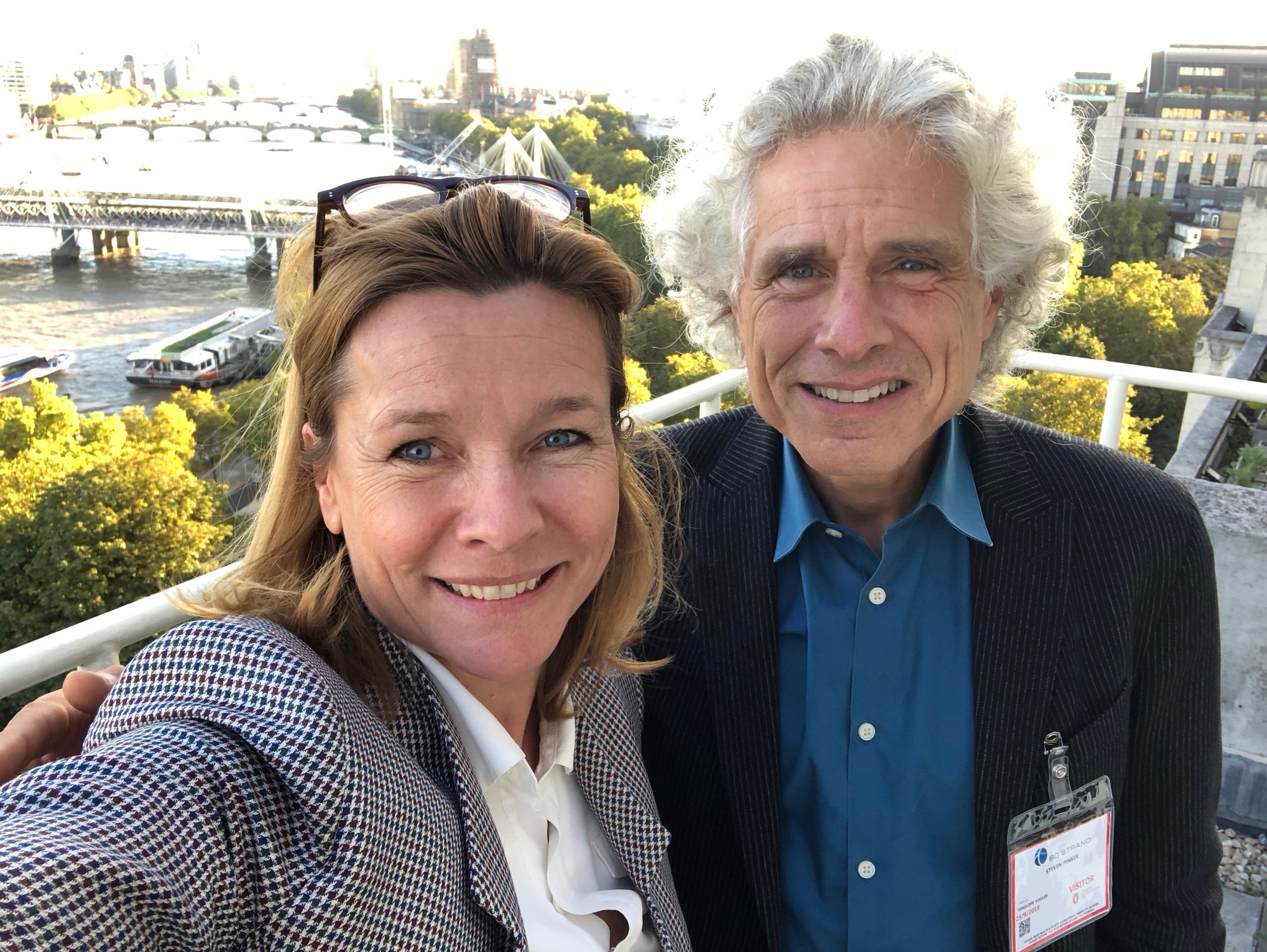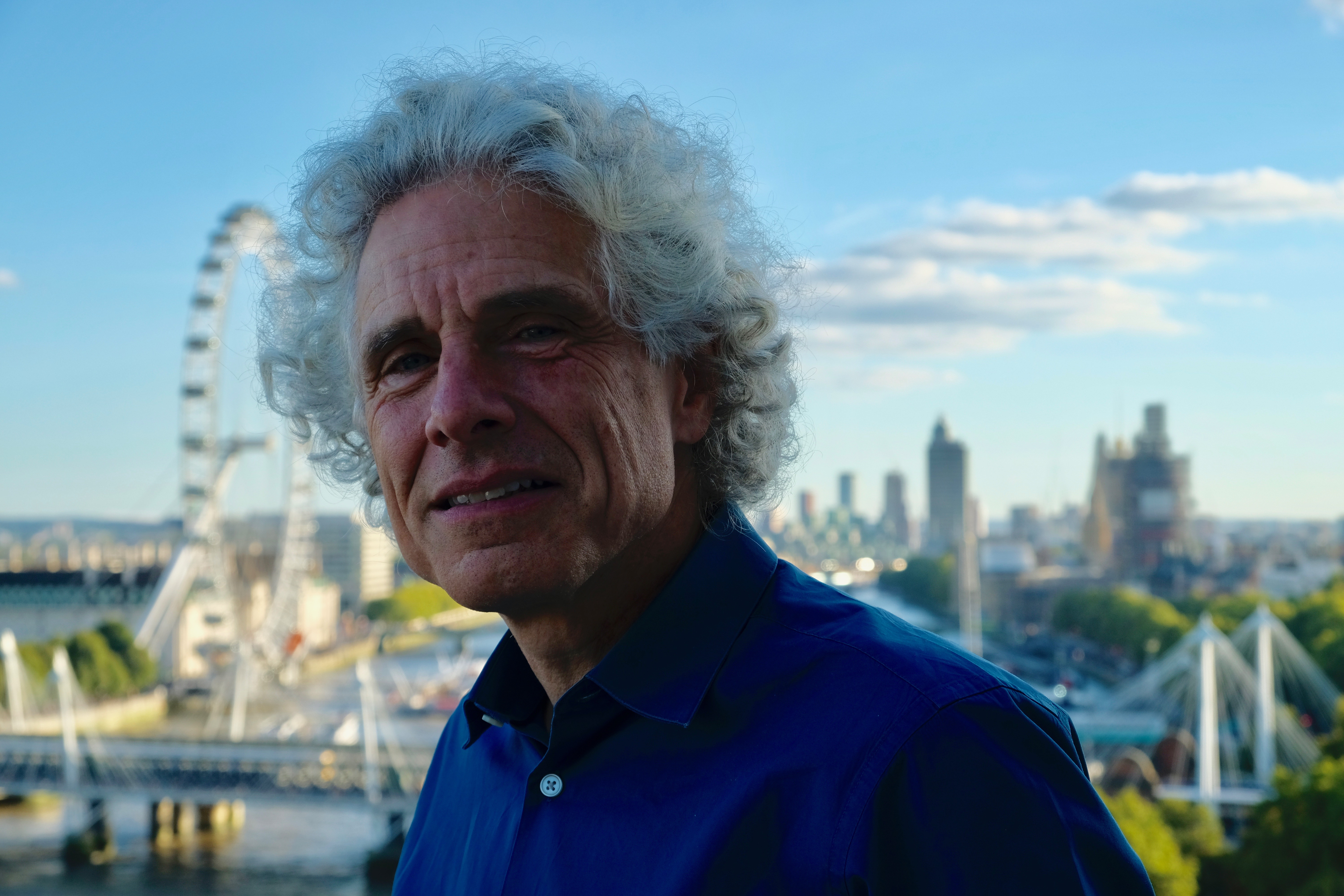“No reason to panic – fascism will not replace democracy.”
“No reason to panic – fascism will not replace democracy.”
Bestseller author Steven Pinker about populists and other enemies of progress, the state of democracy and why the world is better off than wie think.
Steven Pinker, 64, Johnstone Family Professor in the Department of Psychology at Harvard University, believes in progress. Not necessarily because he likes to think that way, but because he analyzes data which proof that the world has become a better place. “Since the beginning of entlightenment at the end of the 18th century life expectancy has soared worldwide from 30 years to 71, in more wealthy countries to 81”, he writes in “Enlightenment Now. The Case for Reason, Science, Humanism, and Progress.” “Human beings are not only healthier, richer and more secure, but also more free. 200 years ago only a handfull of states - with one percent of the world’s population - lived in democracy. Today democracy spread to two thirds of all countries in the world, in which two thirds of the world’s population live.”
The election of Donald Trump to the White House was a real blow to Steven Pinker. “It seemed terribly misplaced then to write a book about progress”, he says. But his wife Rebecaa Goldstein sent him back to work: His book was more needed now than ever. She turned out to be right. In the age of fear and anger that turns against elites and experts “Enlightenment Now” with its massive volume of data is a scientifitcally charged weapon against the post-fact society à la Trump. And it became a besteller. “No matter what it does to book sales”, the author says in an interview with me in London, “I would rather have a world without Donald Trump.”
Profil: I have bad news for you, Professor Pinker: Life expectancy in GB has stalled this year.
Pinker: If eveything would improve all the time it would not be progress , it would be magic. There is no force that guarantees progress all the times and in my book I also list cases of regression. Life expectancy in the US as decreased because of the Opoids epedemics. But overwhelmingly the trend is towards improvement.
Profil: So death by chemical prescription drugs – in America two thirds of overdosis deaths are currently caused by it - are small bumps only in the curve of overall progress?
Pinker: We cannot be certain. But history has shown that these developments were only small bumps. I wrote a book 15 years ago that was called “The Blank Slate” arguing that human nature exists and has a dark side and that means that we will never achieve utopia. But I came across data sets from different aspects of violence and how it went down in so many ways. It is difficult to appreciate this trend if you watch the news because as long as violence has not stopped completely there will always be a reason to report on cases of violence. Enlightenment Now! Was inspired by coming across data sets that showed it was not only violence that decreased. But also poverty, desease, hunger, illteracy, work hours. Progress is diffcult to see from news but can be appreciated from data corraborated by history.
Profil: The Zeitgeist is more about dystopian anxiety and furor against elites and experts. Did you become the counter trend by accident?
Pinker: Somewhat by accident, yes. Populism resulted in setbacks such as the election of Donald Trump in the United States. Trump certainly represents the rollback on certain areas of progress. He lacks respect for democratic institutions, international organizations, attempts to protect the climate. Free Trade. We should be concerned. Progress becomes possible when people are concerned when it is threatened. It is not time to panic and to think we are on the brink of fascim.
Profil: Fascism is a big word.
Pinker: Trump represents certain currents, which are reminiscant of fascism. And that’s why we should be concerned. But he is not the only thing that is happening. There is a system of checks and balances in the United States. which is more robust than we would have hoped for and has not collapsed. There is a widespread reaction to his policies and as his supporters get old and die, they are replaced by the millenials and his support will decline. This will be accelarated by the tide of urbanisation. And by rising education. There are reasons to think that authoritarian poulism is not necessarily the way of the future.
Profil: Are you not too optimistic? Your president is still astonishingly popular.
Pinker: Trump came to power with a deeply pessimistic dystopian narrative. His infamous inaugural address, the “carnage” speech, portrayed the country as sinking into violence and dysfunction. And this was partly what brought him to power in the first place. It is factually incorrect. And it is dangerous to leave it unchallenged.
Profil: You argue that inequality is not only bad. But a third of the population in the US is living on the brink or in poverty. What can be good about that?
Pinker: This is a relevant oberservation. But it isn’t a matter of inequality, it is a matter of human wellbeing. If you are sick and have no health insurance you cannot get well. The real problem is well being. Morally we should be more concerned about well being than inequality. The problem with being sick and not being able to afford a doctor is not that other people, the rich people, can afford to see a doctor when they are sick, the problem is that the poor people can not afford to see a doctor to get well.
Profil: It seems that people don’t seem to like facts. The big winners currently are Trump, Brexit, right wing populist elections victories in Europe…
Pinker: I don’t think that people don’t like the truth, they often value tribal loyalty above truth. They like to believe in a version of the truth that makes their tribe virtuous and powerful and makes their opposing tribe look weak and foolish and evil. We always had that tendency. It is not that the people don’t like facts at all. And indeed people will respect facts when their children get sick or fixing their car. The political realm tends to amplify a lot of things when it comes to irrationality. For a number of reasons it makes politics almost pathological to the extent it does not promote truth. Nobody can take the time off work to understand the implications of changing tarriff regimes. We have to be able to rely on experts and politicians. So the challenge is how to make politics more aligning with facts seeking. We need politics to resist the temptation of mythology and tribalism.
Profil: That seems to be a tough job right now. People live in their bubbles. It is hard to challenge Fox News.
Pinker: Fox has invited me to some of their smaller shows. We see an alarming amount of fake news, that is true, but still more peope watch CNN and other major networds and read “USA Today” and “The Wall Street Journal” and “The New York Times”. We don’t know how influential these fake news are. It does not matter if they come out of Macedonia or the US. We just should get the facts out there.
Profil: In your book you describe what is new since the enlightenment: the power of information for everyone. It carries advantages and dangers.
Pinker: In a way we go through something now, which our ancestors had to deal with when the Pirnting Press was invented. Suddenly fake bibles appeared, rampant plagiatism was spreading. It took a while until this settled down and certain institutions gained the trust of people and certain procedures and norms became entrenched. Now with social media it is all so new that we haven‘t yet developed a regime – I mean norms not government control - that promotes accurancy and responsibility.
Profil: Scary thought that those self-empowered techno-giants that you mention in you book are like Mark Zuckerberg not able to control what they created. And that is the best case. The worst case is when they create something, which is outside of government control and more powerful than governments.
Pinker: Two slightly different concerns. Zuckerberg was massively humbled by having to testify infront of congress Together with the less formal feedback New Year Resolution to fix Facebook. I hope it is serios and backed up by action to stop interference in elections and illicit use of data. Will Zuckerberg succeed? The correct answer is: We don’t know. But also: Do you want a guy like Donald Trump control Facebook?
Profil: That is how far we got with the mistrust in our own institution. You mistrust the elected president of the United States and rightly so. Is the state not our protector anymore?
Pinker: In the past presidents in the US might have struggled with the critical media but they got the concept. The current president does not seem to understand that the media is not there to please him. I am shocked that he does not even understand it well enough to at least pretend to respect it. It does not occur to him that there is a problem with a government that demonizes a press that critizes him.
Profil: In Austria the Interior Ministry sent an email recently to restrict information to “critical media”. It is 2018 and some people in government do not understand that critical media is the foundation of democracy and its system of checks and balances.
Pinker: In this case it is a funny strategy because if the friendly media publish something the critical media can still take it from them.
Profil: You mean it is a half-serious attempt to control the media?
Pinker: Yes, it would be worse, if they jail ciritical journalists. Media literacy needs to be part of education starting in the elementary school. We need to encourage norms and institutions that steers the free press in the direction of accuracy and away from conspiracy theories and rumours.
Profil: We used to have the US as beacon of democracy. Now we have leaders like Trump, Vladimir Putin and Racep Taib Erdogan - authoritarian leaders who do not seem to understand why democratic institutions are so important. You give us numbers about the spread of democracy but are you not scared that we have reached the peak and roll back our own rights?
Pinker: I am definetly concerned and would be even more so if I lived in Poland, where my family left in the 1920ties. But in the 1970ties the world had only 31 democracies. Today it has 103. Half of Europe – including Poland – lived under Soviet totalitarianism. Spanish had a fascist dictatorship, Greece was under a military junta. Almost all of Latin America, South Korea, Taiwan, Philippines, Indonesia. And today? All of them democratic. To say with the threats in a few countries democracy is doomed is just an exaggerated catastrophism. To write the epitagh of democracy is contrary to the facts.




